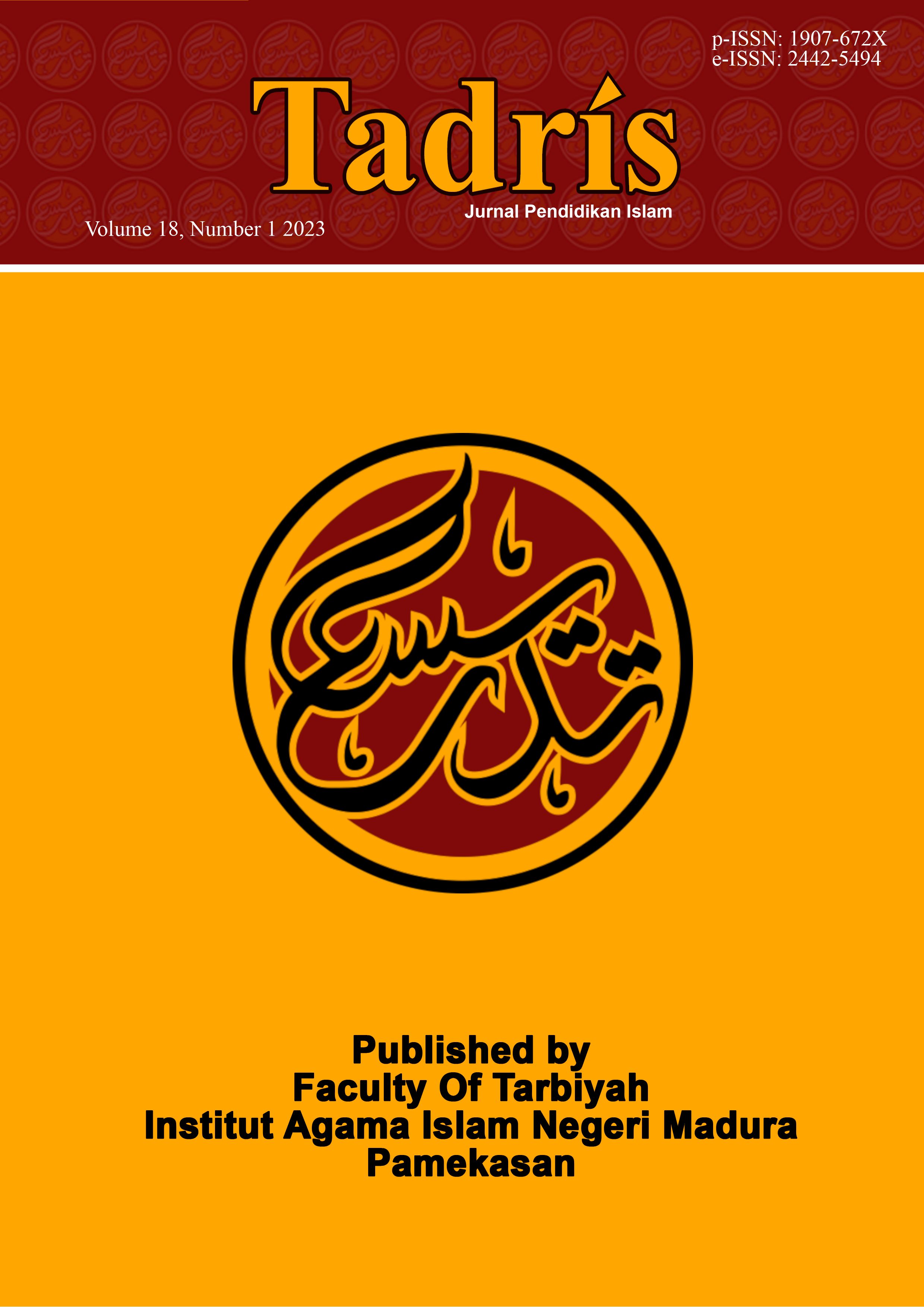The Educational Ideas of KH. Muhammad Syamsul Arifin and Their Relevance to Modern Education: From 1980 to 2021
 Abstract views: 237
,
Abstract views: 237
,
 PDF downloads: 159
PDF downloads: 159
Abstract
The objective of this research is to uncover the educational ideas presented by Kiai Muhammad and their consistent application in LPI Darul Ulum Pondok Banyuanyar Pesantren Pamekasan, which is one of Indonesia's oldest Pesantrens, from the year 1980 to 2021. Additionally, the aim is to explore the significance of these ideas in the context of contemporary education. This study involves qualitative research using library and content analysis as an analysis technique to examine both primary and secondary data sources. The Primary data sources come from the written works of Kiai Muhammad, namely the book "Kalam Hikmah" while the secondary data sources are gathered from other relevant sources. The study reveals that Kiai Muhammad rendered 41 years of education service from 1980-2021. During this period, he accomplished remarkable feats by establishing Pesantren and formal educational institutions ranging from preschool up to college level. These institutions have proliferated both in the number of students and quality of education, attaining several recognitions and accolades at various levels. The foundation of Kiai Muhammad's educational work was based on two key concepts: nationality and science. The outcomes of these two ideas hold great significance for the current educational criteria established by the government, specifically, the 8 Standard Pendidikan Nasional (Eight National Educational Standards) that encompass aspects such as content, process, graduate competence, educators and staff, facilities and infrastructure, management, financing, and evaluation.
Downloads
References
Akhbam. ‘Stiba Darul Ulum’, n.d. http://akbam.org/stiba-darululum/.
Alim, Akhmad. ‘Pendidikan Jiwa Ibn Jauzi Dan Relevansinya Terhadap Pendidikan Spritual Manusia Modern’. Universitas Ibn Khaldun Bogor, 2011.
Al-Jauhari. Shahhah Al-Lughah. Beirut: Dar al-Kutub al-’Ilmiyah, 2012.
Al-Nadwi, Abu Hasan Ali. Al-Tarbiyah Al-Islamiyah Al-Hurrah. Beirut: Muassasah al-Risalah, 1977.
Al-Zabady, Fairuz. Al-Qamus al-Muhith. Beirut: Dar al-Kutub al-’Ilmiyah, 2012.
Amir, Faisal. ‘Banyuanyar Senantiasa Dukung Keutuhan NKRI’. banyuanyar.net, 2022. https://banyuanyar.net/detail-banyuanyar-senantiasa-dukung-keutuhan-nkri.html.
Bachtiar, Amsal. ‘Pengantar Prof. Dr. Amsal Bakhtiar, Guru Besar UIN Syarif Hidayatullah Jakarta Pada Buku, Buku “Syaichona Persembahan Alumni LPI Darul Ulum Pondok Banyuanyar Pesantren”’, 2021.
Baidowi, Achmad. Kalam Hikmah KH. Muhammad Syamsul Arifin. Yogyakarta: UIN Suka Press, 2019.
———. ‘Memaknai Pancasila Dari Ponpes Banyuanyar’. republika, 2020. https://www.republika.co.id/berita/63974/KH_Hasyim_Muzadi_Saatnya_Pesantren_Mengintelekkan_Santri.
———. No TitleKiai Istiqomah, Biografi RKH. Muhammad Syamsul Arifin. Pamekasan: Litbang Peradaban, 2021.
Darid, Ibnu. ‘Jamharatul Lughah’. In 3. Beirut: Dar al-Kutub al-’Ilmiyah, 2011.
Denty. ‘Kemendikbudristek Pertegas Komitmen Menghapus Kekerasan Seksual di Lingkungan Pendidikan – BPMP Aceh’, 19 January 2023. http://lpmpaceh.kemdikbud.go.id/?p=4955.
Faris, Ibnu. Maqayis Al-Lughah. Beirut: Dar al-Kutub al-’Ilmiyah, 2002.
Hamsah, Muhammad. ‘Pemikiran Pendidikan K.H. Ahmad Dahlan Dan Relevansinya Dengan Dunia Pendidikan Modern’. Risalah: Jurnal Pendidikan Dan Studi Islam 7, no. 2 (2021). https://doi.org/10.31943/jurnal_risalah.v7i2.198.
Ismail, Subriadi. ‘Profil Pondok Banyuanyar Pesantren’. banyuanyar.net, 2015. https://banyuanyar.net/banyuanyartv-profil-pondok-pesantren-banyuanyar.html.
Jalaluddin, Ach. ‘RKH. Muhammad Syamsul Arifin Pernah Jelaskan Peran Ilmu Bagi Pemiliknya’. banyuanyar.net, 2021. https://banyuanyar.net/detail-rkh-muhammad-syamsul-arifin-pernah-jelaskan-peran-ilmu-bagi-pemiliknya.html.
Nata, Abudin. Tafsir Ayat-Ayat Pendidikan. Jakarta: PT. Grafindo Persada, 2022.
Ngalimun, and Yusup Rohmadi. ‘Harun Nasution: Sebuah Pemikiran Pendidikan Dan Relevansinya Dengan Dunia Pendidikan Kontemporer’. Jurnal Terapung: Ilmu-Ilmu Sosial 3, no. 22 (2021). http://dx.doi.org/10.31602/jt.v3i2.6016.
Priyono. Metode Penelitian Kuantitatif. Sidoarjo: Zifatama Publishing, 2016.
Ridho, Rasyid. ‘Komnas Anak: 285 Orang Anak Terlibat Tawuran Di Banten, 4 Meninggal Dunia’, 13 November 2022. https://regional.kompas.com/read/2022/11/13/121109278/komnas-anak-285-orang-anak-terlibat-tawuran-di-banten-4-meninggal-dunia.
Sidebang, Flori. ‘Perguruan Tinggi Ikut Sumbang 86 Persen Koruptor, Ini Penyebabnya’. Republika Online, 27 August 2022, sec. Pendidikan. https://republika.co.id/share/rh9f00396.
Sudatro. Metode Penelitian Filsafat. Jakarta: Raja Grafindo Persada, 1996.
Syarif, Zainuddin. Dinamisasi Manajemen Pendidikan Pesantren. Pamekasan: Duta Media Publishing, 2018.
Syukkur, Abdul. ‘Banyuanyar, Potret Salah Satu Pesantren Tertua Di Madura’. republika, 2021. https://www.republika.co.id/berita/qn69jx320/banyuanyar-potret-salah-satu-pesantren-tertua-di-madura-part3.
Tafsir, Ahmad. Fisafat Pendidikan Islami. Bandung: PT. Remaja Rosdakarya, 2012.
Zamakhsyari. Asasul Balaghah. Beirut: Dar al-Kutub al-’Ilmiyah, 2013.
Copyright (c) 2023 TADRIS: Jurnal Pendidikan Islam

This work is licensed under a Creative Commons Attribution-NonCommercial 4.0 International License.
The journal operates an Open Access policy under a Creative Commons Non-Commercial 4.0 International license. Authors who publish with this journal agree to the following terms:
- Authors retain copyright and grant the journal right of first publication with the work simultaneously licensed under a
 Commons Attribution-NonCommercial 4.0 International License
Commons Attribution-NonCommercial 4.0 International Licensethat allows others to share — copy and redistribute the material in any medium or format, and adapt — remix, transform, and build upon the material.
- Authors are able to enter into separate, additional contractual arrangements for the non-exclusive distribution of the journal's published version of the work (e.g., post it to an institutional repository or publish it in a book), with an acknowledgement of its initial publication in this journal.
- Authors are permitted and encouraged to post their work online (e.g., in institutional repositories or on their website) prior to and during the submission process, as it can lead to productive exchanges, as well as earlier and greater citation of published work (see The Effect of Open Access).














